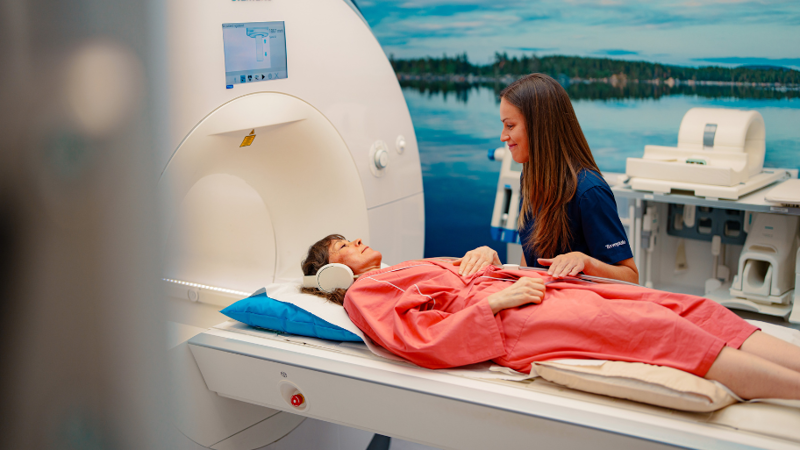Long COVID can cause fatigue, exhaustion and trouble concentrating – goal-oriented treatment supports return to everyday life
Post-COVID-19 syndrome or long COVID is a rare condition, but for some, the symptoms may be quite severe. Terveystalo has launched a long COVID treatment service that supports the work ability of working-age customers by addressing the syndrome before it has the chance to become chronic. The prognosis for the illness is excellent.

Long COVID causes various symptoms and starts within three months of COVID infection.
“It is important to address long COVID as the COVID-19 virus is here to stay. Luckily, however, it appears that the most recent variants have a reduced incidence of long COVID. This is indicated, for example, by the results of the ICOSS project of the University of Helsinki”, says Terveystalo Neurologist Markku Partinen who also acts as a member of the long COVID expert committee under the Ministry of Social Affairs and Health.
Common symptoms of long COVID include fatigue and brain fog – the symptoms may also significantly impact work ability
Intense fatigue and exhaustion are some of the most common symptoms of long COVID.
“Sickness absences due to fatigue and exhaustion have increased by 36% from the beginning of 2020 to the end of 2021, and the figure keeps rising. This may be impacted by both long COVID and the general increase in fatigue and exhaustion symptoms during the pandemic,” says Partinen.
Other key symptoms of long COVID include trouble sleeping, shortness of breath and so-called brain fog. The symptoms may also affect the person’s work ability.
“Occupational healthcare customers have described symptoms such as memory loss and impaired learning capacity. Information worker have reported difficulty concentrating at work. Many have also described symptoms of insomnia, anxiety and shortness of breath,” says Terveystalo Occupational Healthcare Specialist Aleksandra Sulg who also works as a senior physician at the outpatient clinic for long-term COVID-19 symptoms at Helsinki University Hospital.
The prognosis for long COVID is excellent; goal-oriented treatment supports recovery
Goal-oriented treatment plays a key role in the person’s recovery and ability to return to their normal everyday life and work as soon as possible.
“Addressing the symptoms quickly helps avoid a prolonged illness. The prognosis for long COVID is excellent; about 80% of the patients recover quickly, while 10% experience prolonged symptoms for a year or more. 5% experience symptoms for even longer¹,” says Partinen.
As there is currently no known treatment specifically for long COVID, the treatment is based on alleviating and eliminating the patients’ symptoms. Terveystalo has opened a long COVID treatment service offered by a multiprofessional network of physicians. Patients are not required to produce a certificate of having had COVID-19.
“The treatment is started by excluding any other possible diagnoses, as usual. For example, prolonged cough is first examined with asthma tests, and if the patient suffers from cardiac or chest pain, we need to exclude the possibility of coronary artery disease. If we can’t find any other reason for the symptoms, we then prepare the patient’s treatment and rehabilitation plan for long COVID. As the syndrome has multiple symptoms, the treatment should be planned accordingly,” says Sulg.
Physical therapy or psychophysical therapy are some of the most important methods of treatment.
“The most typical symptom of long COVID is fatigue and exhaustion. This means that even going to the grocery shop may feel so tiring that the person needs to rest for hours. Resting and especially staying in a lying position for prolonged times impairs the person’s physical health. This, in turn, makes it difficult to return to everyday life. A physical therapist can help the patient find the right balance between exercise, strain and rest. At the same time, the patient learns skills such as breathing exercises to calm their sympathetic nervous system,” says Sulg.
“It is important to address long COVID as the COVID-19 virus is here to stay. Luckily, however, it appears that the most recent variants have a reduced incidence of long COVID.”
Young, working-age adults are one of the risk groups of long COVID
Long COVID is also reflected on working life because, in addition to those who have suffered a severe case of COVID, the syndrome seems to particularly affect young, working-age adults.
“Long COVID targets two groups: first, those who have suffered an extremely severe COVID-19 infection that required intensive care. In that case, it is referred to as post-intensive care syndrome. The second risk group is young adults who originally suffered a very mild COVID-19 infection.² The reason is suspected to be related to immunology, for example, but further research is needed,” says Partinen.
Women, considerably overweight people, diabetics and people suffering from severe sleep apnea, autoimmune disorders, joint hypermobility or anxiety, for example, are more likely to develop long COVID.
Long COVID refers to a syndrome where the symptoms start within 3 months of having COVID and last for at least 2 months
Keep an eye out for these symptoms:
- You feel tired and exhausted
- You sleep poorly; you suffer from insomnia or sleep disorders
- Your ability to tolerate stress or strain is weakened
- Your heart rate is elevated
- You have memory symptoms or brain fog (trouble concentrating, slow processing of information)
- You feel shortness of breath
- You have constant headaches
- Your sense of smell and taste are impaired
- Your joints and muscles ache
Latest articles

How technology helps relieve mental stress: "When the load is high, the threshold must be low."
Mental health disorders have overtaken musculoskeletal disorders, which had long been the leading cause of sick leave. Work is changing, and the range of sick leave caused by mental health issues has also changed. We must be able to offer new solutions to this challenge.

Extensive data set of 200,000 samples: Nightingale study reveals link between illness risks and sick leave
Data from the Finnish Nightingale study, which is used in Terveystalo's occupational health services, reveals a clear link between lifestyle-related health risks and sick leave. The exceptionally extensive data set of over 200,000 customers shows that people with a low risk of illness had significantly fewer absences, while those in high-risk groups had more absences. The results highlight the importance of preventive healthcare in ensuring work ability and the competitiveness of companies.

Strong identification speeds up your service experience when calling us
Soon you can identify yourself easily and securely before your call is answered. Read below to see how the identification process works.

Terveystalo's digital services have been awarded the internationally recognized ISO27001 information security certification.
Terveystalo's information security practices, processes, and risk management are in line with international best practices.

Does massage help relieve stress? – Touch restores and calms the body and mind
Stress is not always visible on the outside, but the body does show signs when the strain increases. According to Lassi Ylönen, a trained massage therapist at Terveystalo Rela, the body often communicates stress through subtle signs.

Circular economy and artificial intelligence boost performance and improve care
At the heart of sustainable healthcare, technology serves as a tool for improving both the quality of care and accountability. Terveystalo favors solutions that combine sustainability, cost-effectiveness, and medical expertise.